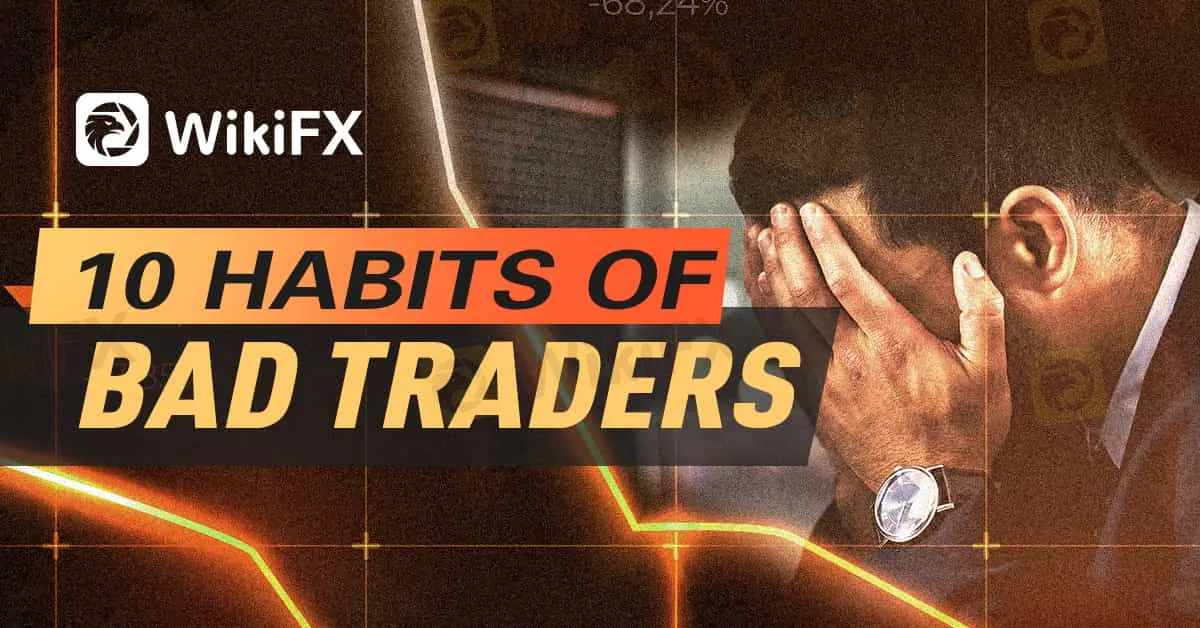简体中文
繁體中文
English
Pусский
日本語
ภาษาไทย
Tiếng Việt
Bahasa Indonesia
Español
हिन्दी
Filippiiniläinen
Français
Deutsch
Português
Türkçe
한국어
العربية
10 Habits of Bad Traders
Abstract:Forex trading can be unforgiving, especially for traders who possess certain habits that can lead to substantial losses. In this article, we'll explore ten habits that characterize bad traders in Europe and ways to avoid them.

Forex trading can be unforgiving, especially for traders who possess certain habits that can lead to substantial losses. In this article, we'll explore ten habits that characterize bad traders in Europe and ways to avoid them.
Overtrading: Bad traders have a compulsion to trade excessively, even when market conditions are unfavorable. This habit leads to increased transaction costs and potential losses.
Ignoring Risk Management: Bad traders often neglect risk management, putting a significant portion of their capital at risk on a single trade without proper risk control measures.
Lack of Patience: Impatience can be detrimental in forex trading. Bad traders jump into trades hastily without waiting for suitable entry and exit points.
Emotional Trading: Bad traders allow emotions to govern their decisions, leading to erratic trading behavior based on fear or greed.
Greed for Quick Profits: Bad traders seek quick profits and often engage in high-risk strategies, neglecting the importance of sustainable and consistent growth.
No Trading Plan: Bad traders lack a well-defined trading plan and often trade impulsively without a clear strategy in mind.
Ignoring Market Analysis: Instead of conducting thorough analysis, bad traders rely on hearsay or gut feelings, leading to uninformed decisions.
Revenge Trading: After experiencing a loss, bad traders engage in revenge trading, trying to recoup their losses quickly. This approach rarely ends well.
Lack of Learning: Bad traders are resistant to learning and improvement. They refuse to acknowledge mistakes and miss out on opportunities to grow.
Not Seeking Reliable Resources: Bad traders miss out on valuable resources like WikiFX, which provides crucial information, broker reviews, and educational content to help traders make informed decisions. Avoid these bad habits and check out WikiFX today to enhance your trading knowledge and skills.

Disclaimer:
The views in this article only represent the author's personal views, and do not constitute investment advice on this platform. This platform does not guarantee the accuracy, completeness and timeliness of the information in the article, and will not be liable for any loss caused by the use of or reliance on the information in the article.
Read more

Nigeria's Oil Crisis: How Are Stakeholders Responding?
Despite being rich in oil, Nigeria struggles with refining shortages. What’s behind this paradox, and how are different actors reacting?

Silver surges past $33—are you ready for what comes next?
Silver has once again become the center of attention in global financial markets.

171 years! One of this country’s largest crypto-related fraud
A federal court in Brazil has handed down one of the harshest sentences in the country’s history for a crypto-related fraud, jailing three executives of the now-defunct Braiscompany scheme to a combined 171 years behind bars. The case, which saw some 20,000 investors lose approximately R$1.11 billion (about USD 190 million), underscores Brazil’s intensifying crackdown on unregulated cryptocurrency operations

Protect Your Portfolio in the Storm | What Are Safe Haven Assets?
Gold surged to an all-time high on Tuesday, driven by renewed weakness in the US dollar, ongoing trade war tensions, and critical remarks from President Donald Trump aimed at the Federal Reserve. These factors fuelled strong demand for safe-haven assets, pushing bullion above US$3,485 an ounce for the first time. But what exactly are safe haven assets? Why is everyone raving about them?
WikiFX Broker
Latest News
eXch Exchange to Shut Down on May 1 Following Laundering Allegations
How a Viral TikTok Scam Cost a Retiree Over RM300,000
JT Capital Markets Review
FCA Proposes Simplifying Investment Cost Disclosure for Retail Investors
Fresh Look, Same Trust – INGOT Brokers Rebrands its Website
FCA Issues Alerts Against Unauthorised and Clone Firms in the UK
Consob Orders Blackout of 9 Fraudulent Financial Websites
Tradu Joins TradingView for Seamless CFD and Forex Trading
Japan Issues Urgent Warning on $700M Unauthorized Trades
Silver surges past $33—are you ready for what comes next?
Currency Calculator


